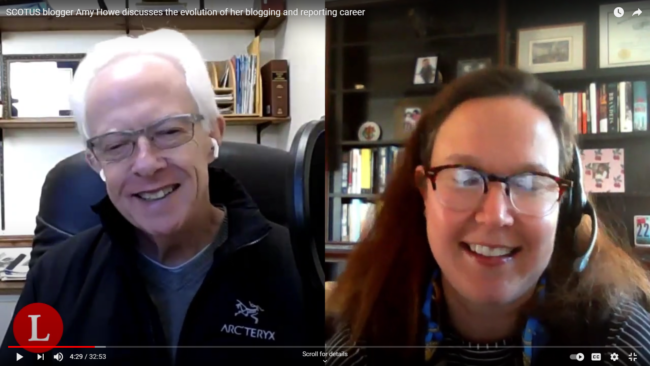I have been tracking social media trends and sharing my thoughts on how they will impact lawyers for more than a decade now. One of my first articles about lawyers and social media, “Can Lawyers Afford to Ignore Social Media?” was from November 2008. In it I urged lawyers to pay attention to social media: “Knowledge is power. Smart practitioners will choose to learn about and appreciate the effect of emerging and affordable technologies upon the practice of law.”
Two years later, a book that I co-authored with my fellow Above the Law columnist, Carolyn Elefant, was published by the American Bar Association. In Social Media for Lawyers: The Next Frontier, Carolyn and I provided an overview of the the most important social media platforms existing at the time (including LinkedIn, Twitter, and Facebook) and explained how and why lawyers should participate on them.
Since that time, I haven’t found any of the new social media platforms to be particularly useful for lawyers — until now that is. That platform is Clubhouse, and I’m really excited about it because I believe it holds incredible promise for lawyers.
If you’re not already familiar with it, Clubhouse is an audio chat platform that is available as an iOS app and is invite only for now. It consists of user-created drop-in audio chat rooms. You can form your own chat room or join rooms created by others. These chat rooms can be created spontaneously or scheduled ahead of time. Topics run the gamut, and there’s something for everyone no matter what your areas of interest.
When you create a room, you’re the moderator and appear on the virtual “stage” along with any other users you’ve invited to be on the stage with you. And when you enter rooms created by others, you enter as a participant and are automatically muted, while those on the stage are able to speak. But you can raise your hand to indicate that you have a question or would like to contribute, and if you’re added to the stage by the moderator, you’re able to speak and share your thoughts on whatever topic is being discussed.
Clubhouse is very active, and there are always lots of chat rooms open at any given time. Some are scheduled for a set time, such as an hour, while others have no time limit. In fact, some chat rooms have gone on for days. No matter the format, you can come and go from any room as you please — with the click of a button you can quietly exit a room if you decide you’ve had enough. To learn more about the ins and outs of Clubhouse, check out this post.
The reason Clubhouse is such a good fit for lawyers is because it’s a great way to showcase your expertise, connect with professional colleagues who might be potential referral sources, and generate exposure for your law firm. The app provides ample opportunities to accomplish all of these goals — it’s simply a matter of learning more about how the app works and then using it strategically.
And best of all, it’s offers a format that is comfortable and familiar to most lawyers. If you’re the moderator of a chat session, it feels as if you’re leading an informal CLE of sorts. And for many lawyers, sharing information verbally is a much better fit than communicating in writing via a blog or by video on YouTube. Notably, audio chat is less formal than writing, and with chat there’s no pressure to create a professionally produced video — or to be perfectly groomed and dressed every time you interact. Instead it’s a decidedly more informal format that is perfect for lawyers seeking to showcase their expertise and share their knowledge.
Lawyers do this in a number of ways on the app. For example, some lawyers host open chats where users are invited to join and “ask a lawyer (or lawyers) a question.” Other host chats that focus on a specific topic related to their practice area(s), such as “talk to a lawyer about protecting your copyright” or “immigration laws and you.” Another option is to join a chat that is focused on one of your areas of expertise and then ask to be added to the stage by raising your hand so that you can provide your input.
No matter how you get onto the stage, whenever you speak in a chat room, the other participants in the event will inevitably click on your profile to learn more about you, thus providing exposure for you and your law firm. They may also then choose to connect with you, or you can choose to request to connect with others in the room.
Once you’ve connected with someone, you’re offered a number of different ways to interact, engage, and amplify each other’s expertise on Clubhouse. This is because when you’re connected with someone on Clubhouse, they will often ping you to invite you to a room that they think might interest you or add you as a speaker to chat they’ve scheduled. Additionally, you’re able to click on a user’s profile and see what room they’re in, and you can then join them in the room if it’s up your alley.
Another reason I really like this app is because the flexibility and convenience offered by Clubhouse can’t be beat. You can hop on the app whenever you have downtime throughout the work day, or during lunch or after hours. No matter when you decide to interact, it’s a great way to make the most of a short break and engage in some quick, one-off networking.
And last, but not least, you can also explore interests outside of work, whether you’d like to learn more about a newfound hobby, engage in a deep-dive discussion about a recent political occurrence, or discuss the latest movies. No matter what you’re interested in, you’ll likely find it being discussed on Clubhouse.
I look forward to seeing you on Clubhouse soon! And if you already belong to Clubhouse, make sure to catch a talk I’m hosting with my co-author, Carolyn Elefant, and other lawyers with social media know-how: “Clubhouse for lawyers: The Next Frontier?” It’s scheduled for Thursday, January 14, at 4 p.m. ET. Hope to see you there!
Nicole Black is a Rochester, New York attorney and Director of Business and Community Relations at MyCase, web-based law practice management software. She’s been blogging since 2005, has written a weekly column for the Daily Record since 2007, is the author of Cloud Computing for Lawyers, co-authors Social Media for Lawyers: the Next Frontier, and co-authors Criminal Law in New York. She’s easily distracted by the potential of bright and shiny tech gadgets, along with good food and wine. You can follow her on Twitter at @nikiblack and she can be reached at niki.black@mycase.com.








 Jordan Rothman is a partner of
Jordan Rothman is a partner of 


 Ellen Trachman is the Managing Attorney of
Ellen Trachman is the Managing Attorney of 



 Kathryn Rubino is a Senior Editor at Above the Law, and host of
Kathryn Rubino is a Senior Editor at Above the Law, and host of 
 Jordan Rothman is a partner of
Jordan Rothman is a partner of